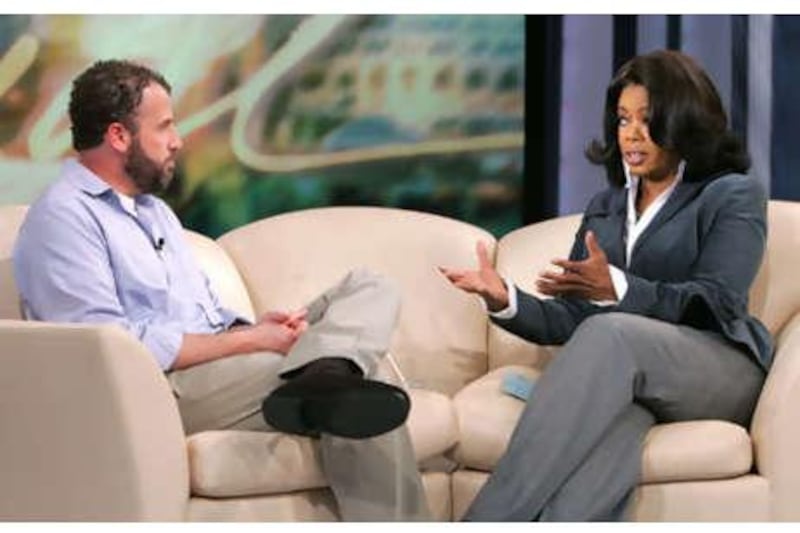Over the past quarter of a century as the host of America's most popular (and longest-running) talk show, the serial philanthropist Oprah Winfrey has made headlines around the world for the gifts she bestows upon her live audiences. But for the premiere of the 25th - and final - season of the show, which aired last week, the billionaire went one better. Each of the 300 specially selected audience members - chosen for their loyalty to the show over the years - are to be flown to Australia, in December, for an eight-day holiday. Winfrey made the grand announcement amid a flurry of confetti, before further adding that the captain piloting the flight (there and back) will be none other than the actor, John Travolta.
Several episodes of the show will be filmed in Australia as a result - marking the first time the programme will have been filmed with an American audience outside of the US - and apparently took several years of planning to put together. And testament to The Oprah Winfrey Show's pulling power, shortly after the news broke, the Australian government declared that it would be spending AUS$3 million (Dh10.4m) on accommodating production of the show. Australian tax payers may not approve of where their hard-earned cash is being spent, but there's no denying that when the Oprah juggernaut chooses something to endorse (in this case a whole country) the bucks roll in.
One of the most famous examples of this isOprah's Book Club - a popular feature on the show since 1996. Out of the 64 titles that she has chosen, many have gone on to become the most talked-about books of the past decade. The astonishing influence her recommendations had on subsequent book sales was nicknamed the "Oprah Effect", but not everyone was thankful to be chosen. The author Jonathan Franzen famously objected to his novel The Corrections being selected for the book club in September 2001. Although Franzen told www.powells.com at the time that he thought Winfrey was "really smart" and "fighting the good fight", he criticised her fiction choices as "schmaltzy" and "one dimensional", and later told the Philadelphia Inquirer that The Corrections was"a hard book for that audience". He also expressed concern that being endorsed by Winfrey could discourage male readers from buying the book. Winfrey withdrew his invitation to appear on the show, though The Corrections remained an official book club pick. The story came full circle with the publication of Franzen's new novel Freedom, however, which became this month's book club book after Winfrey sent him a note asking for permission to feature it.
Some serious authors were less conflicted about the show, however. Winfrey featured Cormac McCarthy's The Road in March 2007. He gave his first television interview to her in June of the same year. Even great works of literature are not immune to the Oprah Effect. Winfrey often chose classic novels, and Leo Tolstoy's Anna Karenina famously shot to number one in the US bestsellers list after her endorsement. The book club newsletter informed fans that it was the first time Winfrey had chosen a book for the club that she had not already read, and she explained: "This book has been on my 'must read' list for years, but I was scared of it. Let's not be scared of it." The publishers Penguin ordered an extra 961,030 copies of the book. Books by Gabriel García Márquez (Love in the Time of Cholera, One Hundred Years of Solitude), John Steinbeck (East of Eden) and William Faulkner (The Sound and the Fury, As I Lay Dying, Light in August) also featured, and saw a spike in sales as well.
But not everyone benefited from the extra scrutiny that the book club brought with it. One of the books that became a bestseller as a result of Winfrey's intervention was A Million Little Pieces, a 2003 memoir by the author James Frey about his recovery from substance abuse. Published to mixed reviews, it wasn't until it appeared on a 2005 edition of Oprah's Book Club that Frey's story became a smash hit, occupying the number one slot on the New York Times bestseller list for 15 consecutive weeks. Unfortunately for Frey, an investigation by the website www.thesmokinggun.com revealed that he had embellished some details in the book, including the fact that he had spent just a few hours in jail, rather than 87 days. The revelation led to one of The Oprah Winfrey Show's most memorable episodes, in 2006, when Frey and his publisher, Nan Talese, were confronted by Winfrey about the facts surrounding the book.
Happily, for most book club authors, there has been no such fallout. In fact, a number have seen their books adapted into films, arguably in part thanks to the boost they recieved from Winfrey. These include Bernhard Schlink's The Reader and The Deep End of the Ocean by Jacquelyn Mitchard, which was the first Book Club pick in 1996. Some have bridled at the idea of a TV talk-show host - even one of Winfrey's stature - wielding so much influence over the publishing industry and the reading lists of her viewers. Others have, like Franzen, questioned her choice of books. What's certainly true is that Oprah's Book Club has encouraged a lot of people to read things they might otherwise not have picked up. The final episode of The Oprah Winfrey Show will air in September next year. Winfrey is launching her own cable channel, OWN, and will host an evening show called Oprah's Next Chapter. Whether there will be another chapter for Oprah's Book Club remains to be seen.











